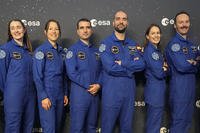Any Uncle Sam replacement to the cheap yet powerful Russian rocket engine used to launch U.S. military satellites is still years away, officials acknowledged.
The Air Force currently contracts with a company called United Launch Alliance LLC, a Colorado-based joint venture between Lockheed Martin Corp. and Boeing Co., to launch military and spy satellites. ULA flies two families of rockets, Delta and Atlas. The latter is powered during its first stage by the Russian-made RD-180 kerosene-liquid oxygen engine.
After Russia's annexation last year of the Crimea territory in the Ukraine and rising tensions between Russia and NATO allies, U.S. lawmakers scrambled to end the Pentagon's reliance on Russian technology for its national-security programs.
As Rep. Mike Rogers, R-Alabama and chairman of the House Armed Services Strategic Forces Subcommittee, bluntly put it during the hearing, "I want a new engine. I don't want a new rocket."
Congress in December authorized $220 million to begin developing a replacement to the RD-180 as part of a massive spending bill called the Omnibus Appropriations Act. Additional funding for the development effort is expected.
But a made-in-America first-stage engine for the Atlas V may not be ready until the next decade. Firms vying to build a domestic alternative to the RD-180 made by NPO Energomash acknowledged they're still years away from having their technology tested and certified.
Blue Origin LLC, the private aerospace company funded by Amazon.com founder and billionaire Jeff Bezos, has spent a significant amount of its own money developing a possible design, called the BE-4, which will be ready to fly in 2019, according to Rob Meyerson, president of the company. (A precursor successfully lifted off earlier this year.)
Aerojet Rocketdyne, the incumbent engine-maker, is some 16 months behind that schedule, an official said. But it plans on having a certified propulsion system, known as the AR-1, around the same time, according to Julie Van Kleeck, vice president of advanced space and launch programs at the company.
Nevertheless, Gen. John Hyten, the head of Air Force Space Command, said it would probably take another year or two after that point to complete the certification process. That means any Atlas 5 rocket outfitted with a new main engine may not be ready until 2021 or later.
Despite some boisterous rhetoric from Russian officials, the supply of RD-180 engines to the U.S. has continued uninterrupted. ULA may need to buy at least 29 more of the propulsion systems in order to generate enough revenue to develop a new rocket, called the Vulcan, designed to compete in both the government and commercial launch markets.
"Either engine path that has just been discussed requires significant investment on the part of ULA," Tory Bruno, head of the venture, testified. "Without the continued revenue generation of the Atlas until that new American engine is available, we will lack the funds to be able to accomplish that activity.
He added, "We need to be able to effectively compete for civil and commercial missions in addition to competing for national security space missions. Without that lower cost rocket and without the investment required to get there, we're simply not economically viable in that window."
Michael Griffin, the former head of NASA, said the U.S. shouldn't fund the development of a new rocket -- or rely solely on commercial companies such as Space Exploration Technologies Corp., known as SpaceX, to launch national-security payloads.
"Some have said that the best forward path is to discard decades of government investment in and experience with the Atlas and to develop a whole new system," he said. "This does nothing to solve today's problems and even if it did, it's irrational to suppose that an entirely new launch vehicle can be obtained more quickly or at less cost than a new engine alone."
He continued, "Others would have us believe that the U.S. government can merely purchase launch services from among multiple competitors as if one were selecting a particular airline for a desired trip based on airfare and schedule. But in reality, the U.S. national security launch architecture is a strategic capability having far more in common with other strategic assets such as fighters, bombers, aircraft carriers and submarines than it does with airlines and cruise ships. The vagaries of the market cannot be allowed to determine whether or not critical payloads make it into space."
In short, he said, "We have an engine problem, not a rocket problem."










